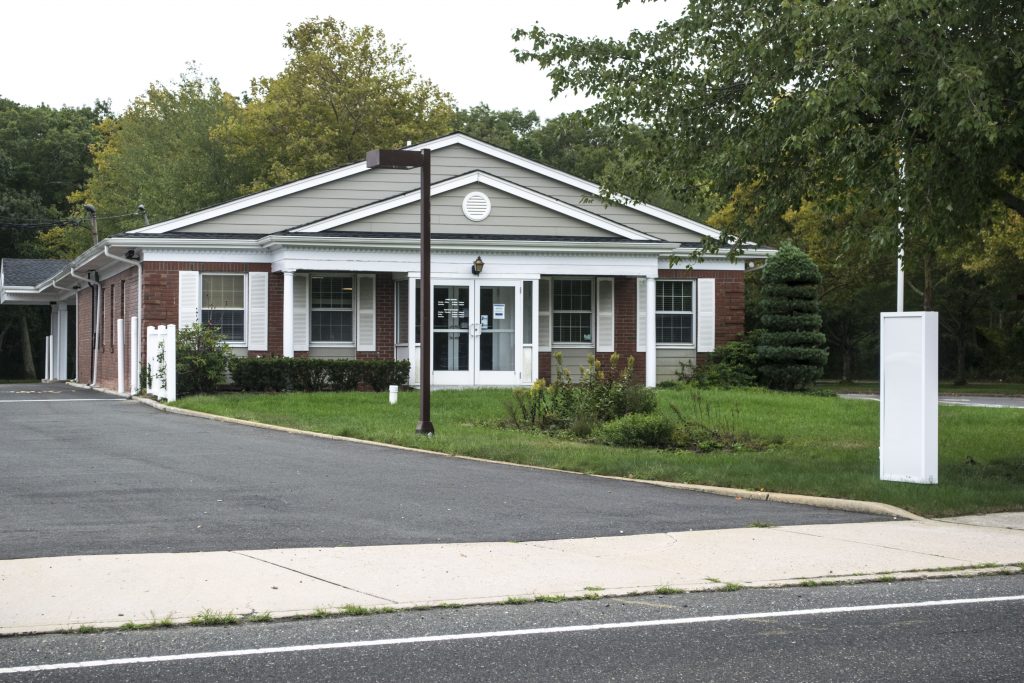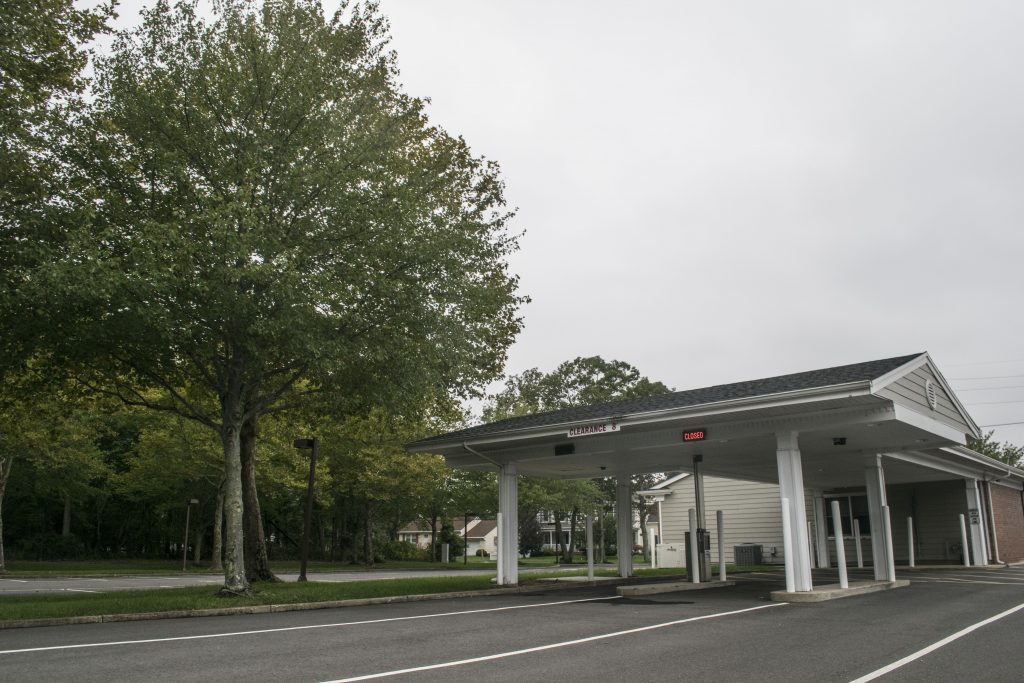
The location where a medical marijuana facility will be proposed in Brick Township. (Photo: Daniel Nee)
Brick Township’s planning board, zoning board and the township as a whole is being sued by the owners of the former bank property originally proposed as a medical marijuana dispensary and grow house.
The company, 385 Adamston LLC, eventually scaled back their proposal to include only the 48,000 square-foot grow house, then reversed course and changed the proposal to retain the grow house, but cultivate lettuce and leafy greens instead of cannabis. In May, the zoning board ruled that indoor farming is not allowed in the Rural Residential zone, where the facility is located. The township’s zoning ordinance allows “customary and conventional” farming in that zone, but includes no definition of “customary and conventional,” which forced the board to hold a determination hearing. At that hearing, the board voted unanimously to determine that indoor farming does not meet the definition and 385 Adamston, also known as Jersey Shore Therapeutic Health Care, must obtain a use variance in order to build their facility.
Between the time when the project was proposed in its original form and when the crop of choice was switched to lettuce, the company filed a new application with the planning board. Unlike the zoning board, which grants variances to provide relief from zoning restrictions, the planning board oversees the applications of properties that are already allowed in their respective zones. In the case of 385 Adamston, the company’s attorney, Dennis Galvin, declared that the project was an allowable use in the zone, despite the fact that the planning board referred the case back to the zoning board. Because the zoning board did not approve or deny the project within a statutory time frame of 45 days, Galvin has taken the stance that it received automatic approval under state law. The planning board, however, did not act because its attorney determined the board had no jurisdiction over the case and the proper venue was the zoning board.
|
|
The controversy has now sparked a lawsuit against the planning board and the township as a whole by 385 Adamston LLC.
Galvin alleges that the township’s planning board attorney did not “notify the plaintiff of any of the supposed deficiencies” in the application. He also argued that because the jurisdictional determination on the part of the planning board was made by its attorney, rather than the board itself, there was no opportunity for the board to provide reasons why the application was deficient or hear the case. The township, of course, has countered in previous correspondence that the board never had any jurisdiction over the matter to begin with as the case was already in the midst of being heard by the zoning board, which ultimately determined a variance was required for the project to commence.

The location where a medical marijuana facility will be proposed in Brick Township. (Photo: Daniel Nee)
The lawsuit also contends that the zoning board, in determining that the 48,000 square foot indoor grow house was not “customary and conventional” farming was an arbitrary and capricious ruling. The board, he said, “considered factors that were irrelevant” and “unreasonably interpreted” the zoning ordinance, invoking the Right to Farm Act and Farmland Assessment Act of 1964.
The lawsuit asks that the zoning board’s determination be set aside by the court, declare that indoor farming is permitted in the zone and grant automatic approval of the application as proposed to the planning board.
The suit also includes a third count alleging that the owners of the proposed farm were denied their constitutional right to due process since the planning board never held a hearing on the application since it transferred the case back to the zoning board.
A fourth count, also dealing with civil rights and due process, alleges that the determination of the board “was based on personal animus that arose out of plaintiff’s proposal to grow medical marijuana.”
On those counts, 385 Adamston LLC is requesting the court direct Brick taxpayers to pay its legal fees and award punitive and compensatory damages, as well as equitable relief.
In an unusual sixth count, Galvin argues that the boards’ actions constitute a de facto taking of the property – known as an inverse condemnation. In this count, the plaintiff asks for damages related to the lost value of the property since it is unable to operate a business there. The complaint goes on to allege that the board “did everything in its power” to ensure the plot of land was preserved as open space for wildlife. A discussion of wildlife impacts or the ability to preserve the property for open space, however, was never discussed at any of the hearing on the case.
As a consequence of this count, 385 Adamston seeks to be compensated for what they allege is a de facto unlawful taking of their property – even though its case to build a farmhouse is still technically pending before the board. In theory, the board could still grant the company a variance to build the grow house, as the case has still not been heard through to its conclusion.
The entire 108 page case jacket, including a slew of exhibits Galvin used to bolster his case, appear below. A court date has not yet been set. The case is to be heard by Ocean County Superior Court Assignment Judge Marlene Lynch Ford. The court has set a 450 day discovery period.
~
Read the Lawsuit:









